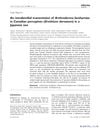 14 citations,
October 2016 in “Psychoneuroendocrinology”
14 citations,
October 2016 in “Psychoneuroendocrinology” Finasteride affects brain processes related to neurotransmission and metabolism, potentially helping with neuropsychiatric conditions.
 14 citations,
January 2016 in “Experimental and molecular pathology”
14 citations,
January 2016 in “Experimental and molecular pathology” Giving immune serum from vaccinated mice to mice without T cells prevents infection and tumor growth.
 14 citations,
May 2011 in “Drug Metabolism and Disposition”
14 citations,
May 2011 in “Drug Metabolism and Disposition” Ketoconazole increases finasteride's effectiveness and lifespan in the body.
 14 citations,
August 2009 in “Cancer epidemiology”
14 citations,
August 2009 in “Cancer epidemiology” AHCC reduces hair loss and liver injury caused by chemotherapy in rodents.
 14 citations,
January 2008 in “Medical mycology”
14 citations,
January 2008 in “Medical mycology” Canadian porcupines in a Japanese zoo passed a skin fungus to each other.
 14 citations,
June 2001 in “Endocrinology”
14 citations,
June 2001 in “Endocrinology” Prolactin affects when mice shed and grow hair.
 14 citations,
October 2000 in “Genomics”
14 citations,
October 2000 in “Genomics” Rat dermal papilla cells have unique genes crucial for hair growth.
 14 citations,
March 1995 in “Journal of cell science”
14 citations,
March 1995 in “Journal of cell science” SV40 T antigen in hair follicles causes abnormal hair and health issues in mice.
 13 citations,
July 2022 in “Frontiers in cell and developmental biology”
13 citations,
July 2022 in “Frontiers in cell and developmental biology” Tiny natural vesicles from cells might help treat hair loss.
 13 citations,
January 2020 in “Scientific Reports”
13 citations,
January 2020 in “Scientific Reports” The African spiny mouse heals skin without scarring due to different protein activity compared to the common house mouse, which heals with scarring.










